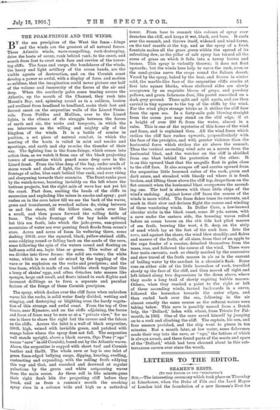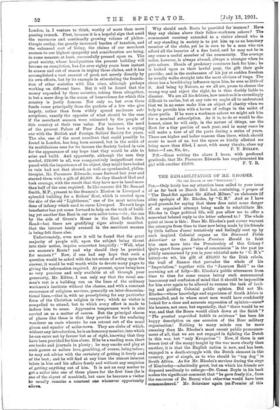LETTERS TO THE EDITOR.
SEAMEN'S RESTS.
(To THE EDITOR OF THE "SPECTATOR:1 Sut,—The interesting ceremony which took place on Thursday at Limehouse, when the Duke of Fife and the Lord Mayor of London laid the foundation of a new Seamen's BRst for London, is, I venture to think, worthy of more than mere passing remark. First, because it is a hopeful sign that amid the enormous and continually growing volume of philan- thropic outlay, the greatly increased burden of taxation, and the enhanced cost of living, the claims of our merchant seamen to our highest sympathy and consideration are being, in some measure at least, successfully pressed upon us. The great society, whose headquarters the present building will become on completion, has for over eighty years been instant in season and out of season in urging those claims, and it has accomplished a vast amount of good, not merely directly by its own efforts, but by its example in stimulating the founda- tion of other societies with like aims, although perhaps working on different lines. But it -will be found that the money expended by these societies, taking them altogether, is but a mere drop in the ocean of benevolence for which this country is justly famous. Not only so, but even these funds come principally from the pockets of a few who give largely, rather than from widely spread moderate sub- scriptions, exactly the opposite of what should be the case if the merchant seamen were estimated by the people of this country at their true value. For instance, the need of the present Palace of Poor Jack has been a crying one with the British and Foreign Sailors' Society for years. The site, one of the most excellent that could possibly be found in London, has long been secured, but in the midst of its multifarious uses for its income the Society looked in vain for the appearance of any hope that they would be able to arise and build. And apparently, although the sum they needed, 224,000 in all, was comparatively insignificant com- pared with the importance of its object, they might have looked in vain had not that shrewd, as well as openhanded, philan- thropist, Mr. Passmore Edwards, come forward last year and started them with a gift of 26,000. So they thanked God and took courage, with the result that they have now in hand more than half of the sum required. In like manner did Mr. Samuel Smith, M.P., present to the Seamen's Mission in Liverpool a splendid building for a Sailors' Rest, which is erected upon the site of the old "Lighthouse," one of the most notorious dens of infamy which used to curse Liverpool. No such large benefactor has yet come forward to help on the work of build- ing yet another fine Rest in our own sailor-town—viz., the one by the side of Green's Home in the East India Dock Road—but there are gratifying signs already manifest that the interest lately aroused in the merchant seaman is being felt there also.
Unfortunately, even now it will be found that the great majority of people will, upon the subject being thrust into their notice, inquire somewhat languidly: "Well, what are seamen's Rests? and why should they be provided for seamen P" Now, if one had any hope that such a question would be asked with the intention of acting upon the answer, it would be well worth while to devote many pages to giving the information required. At present, space being here so very precious and only available at all through your generosity, Mr. Editor, I can only say that the usual sea- men's rest is a building run on the lines of the ordinary workmen's institute without the classes, and with a constant recurrence of religious services, generally on inter-denomina- tional lines,—that is, with no proselytising for any particular form of the Christian religion in view; which no visitor is compelled to attend, but to which every effort is made to induce him to come. Aggressive temperance work is also
carried on as a matter of course. But the principal charm of places like these is that they provide for the seafaring wanderer an oasis whereto he can retreat out of the usual gloom and squalor of sailor-town. They are clubs of which, without any introduction, he is an honorary member, into which he can enter not by favour but as of right, knowing that they have been provided for him alone. If he be a reading man, there are books and journals in plenty; he may smoke and play at such games as sailors love, gambling, of course, being taboo; he may ask advice with the certainty of getting it freely and of the best ; and he will find at any time the utmost interest taken in him and his affairs freely and without any suspicion of getting anything out of him. It is not an easy matter to get a sailor into one of these places for the first time (he is one of the shyest of mankind), but once he becomes a visitor he usually remains a constant one whenever opportunity alloits.
Why should such Rests be provided for seamen? Have they any claims above their fellow-workmen ashore ? The commonest courtesy extended to a visitor abroad who is of any standing in society is to put him up as an honorary member of the clubs, yet he is sure to be a man who can afford all the luxuries of a fine hotel, and he may not be in any sense a useful member of the community. The average sailor, however, is always abroad, always a stranger when he gets ashore. Shoals of predatory creatures lurk for him; he is looked upon as their lawful prey, the gift their gods provide; and in the exuberance of his joy at sudden freedom he usually walks straight into the most obvious of traps. The shore has a bewildering influence upon him, he sees so little of it. And being by Nature, as we all are, prone to choose the wrong way and reject the right, he is thus doubly liable to disaster. We are all his debtors, how much so it is exceedingly difficult to realise, but at any rate we ought all to understand that we in no sense make him an object of charity when we help to provide him with a haven of refuge in the midst of shore perils. If he were a workman ashore we might ask him for a nominal subscription. As it is, to do so would be dis. honest, since he will only, in the nature of things, use the Rest for a tiny portion of each year, and in many cases he will make a tour of all the ports during a series of years. There are higher and holier reasons than these, which should occur to most of us, but the space so kindly allotted me being more than filled, I must, with many thanks, close my
letter.—I am, Sir, &c., F. T. BuLLEN. P.5.—Since writing the above I learn, with profound gratitude, that Mr. Passmore Edwards has supplemented his gilt with another 22,000. F. T. B.







































 Previous page
Previous page